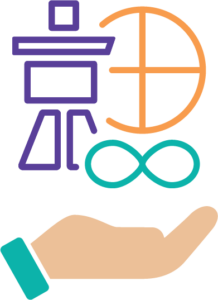Model of Care Toolkit
- Coordination with primary care
- MODELS:
- Diagnostic pathways and rapid referral services
- Delivering culturally appropriate diagnostic care for First Nations, Inuit and Métis peoples
- Connected care post-treatment
- Integrated palliative care
- Connecting patients without a primary care provider to the cancer system
Considerations for delivering culturally appropriate diagnostic care for First Nations, Inuit and Métis peoples
 The Partnership works with partners to design and implement First Nations, Inuit and Métis-led models and identify ways to incorporate innovative models into Indigenous-led cancer care that are self-determined and Peoples’-specific.
The Partnership works with partners to design and implement First Nations, Inuit and Métis-led models and identify ways to incorporate innovative models into Indigenous-led cancer care that are self-determined and Peoples’-specific.
Consider these tips for delivering culturally appropriate diagnostic care:17
- Co-develop care pathways and models of care with First Nations, Inuit and Métis partners and community health services.
- Provide appropriate and accessible translation, interpretation and support services.
- Recruit and retain First Nations, Inuit and Métis healthcare providers and navigators, and strengthen access to culturally appropriate care. Ensure all staff have the knowledge and skills to provide culturally appropriate care to First Nations, Inuit and Métis peoples.
- Ensure culturally appropriate supports are available for First Nations, Inuit and Métis patients and families, including children.
- Prioritize opportunities to bring diagnostic care into communities and when that is not possible, ensure appropriate supports are in place for those who must travel to complete diagnostic interventions.
The Nuka System of Care is a relationship-based, patient-owned approach to transforming health care, improving health outcomes and reducing costs. Developed by Southcentral Foundation in Anchorage, Alaska, the model emphasizes culturally safe, team-based care that integrates Indigenous values and perspectives.
The core tenet of the model is its patient-led approach where care teams prioritize respect and trust by taking the time to cultivate strong relationships with their patients and their patients’ families and community. Patients are empowered to connect to the right care from diagnostic services, treatment supports and post-treatment needs including access to a panel of experts to help support their care decisions.
Multidisciplinary care teams receive training that emphasizes respect and helps develop their interpersonal skills, including communication
